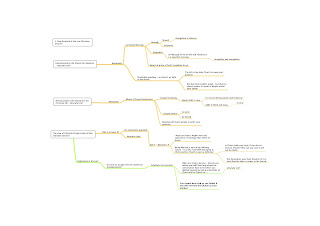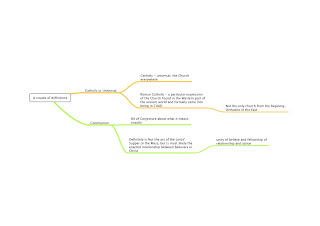





Recently I have changed over from a full script when preaching like
this one for example , to using mind maps to preach from.
The main reason started when we were doing a series on the Apostle's Creed and I have always found Systematic Theology to be much more engaging and useful as teaching, when it was a conversation rather than a lecture (ie. PFJ 3rd year for those who know those sought of things!).
It turns out I am not alone in this, and a series on the Apostle's Creed which was questioned by people before hand as to why we would bother, turned out to be a series that really engaged people and in the end helped them to see its value and to grow together in our understanding.
We are in a context where the congregation size is usually closer to 50 than 150, and so a more conversational style of preaching is easy to use, and in a lot of ways I believe a more effective way of teaching and engaging with people around God's word.
Mind maps are a much quicker and more effective way (than a full text) of ensuring you cover the essential points in a conversation, without the danger of repeating yourself. It helps you to pick a path for the conversation before hand (ie. is this a good point or an unhelpful sidetrack to be cut off at the pass!), while making it easy to cut/change/modify on the run as you need. It really acts as a safety net so you don't miss talking about the gems you have found during your study.
Dialogue is all very trendy and post-modern, but the reality is within certain size limitations it is a much more effective means of God's people meeting. Not a vacuous wander through the garden dialogue, but a well prepared trip through a topic (like a good tour guide maybe), that helps a teacher/preacher engage with the REAL questions of the congregation.
Anyway I have posted some of the Mind Maps I used for the topic of the Catholic Church below - I use a program called Mindnode pro (Mac), and the outline I gave to the congregations.
Since we have gone back to an expository series I have modified my style of preaching. I have kept the mind maps and made sure the preaching/Teaching consciously uses interactive/conversational elements within it - you can here some attempts at i
t here.
Anyway that is where I am up to at the moment!!!





